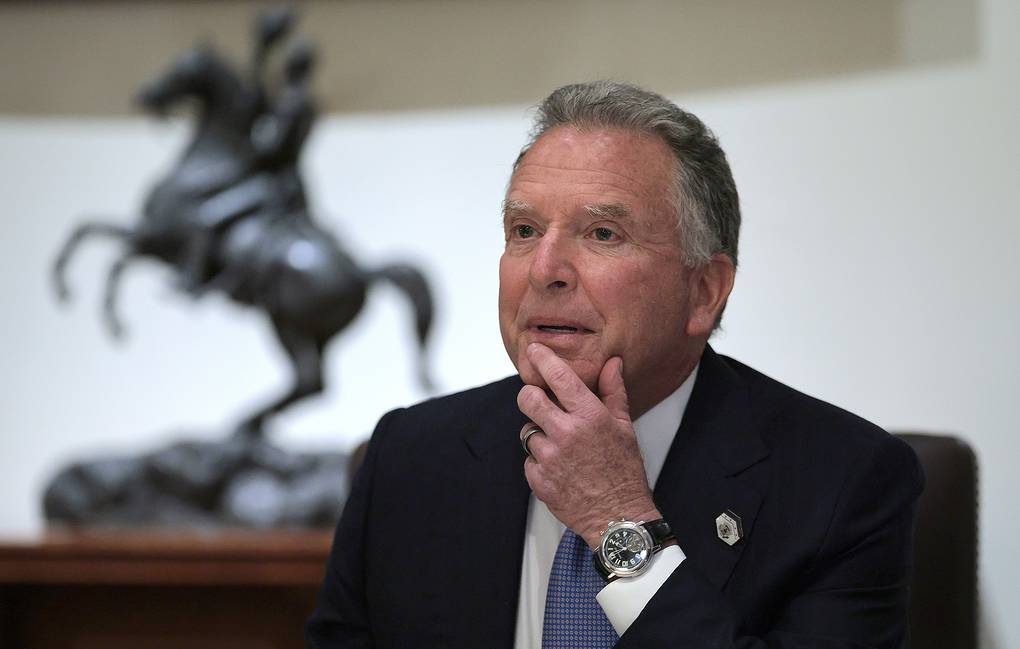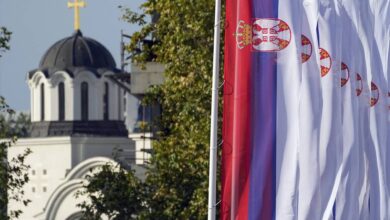Press review: Zelensky floats peace talks amid scandal as EU delays Ukraine membership
Top stories from the Russian press on Wednesday, November 19th US Presidential Envoy Steve Witkoff
US Presidential Envoy Steve Witkoff
MOSCOW, November 19. /TASS/. Vladimir Zelensky mulls resuming peace talks amid a corruption scandal, and the UN Security Council adopts a draft resolution on Gaza based on US leader Donald Trump’s peace plan. Meanwhile, the EU is not considering fast-tracking Ukraine’s membership. These stories topped Wednesday’s newspaper headlines across Russia.
Media: Zelensky floats idea of resuming peace talks amid corruption scandal
On Tuesday, Vladimir Zelensky announced plans to visit Turkey on November 19 to step up negotiations on resolving the Ukraine crisis. According to Reuters, US envoy Steve Witkoff, too, will travel to Istanbul on Wednesday for talks with the Ukrainian leadership.
Last week, Ukrainian National Security and Defense Council Secretary Rustem Umerov, too, arrived in Istanbul. He said holding talks with his Turkish counterparts to restart POW exchanges was the goal of his visit. Meanwhile, no Russian negotiators will attend the November 19 meeting, the Kremlin said, adding that Moscow has not received any details regarding the issue.
Zelensky’s visit to Turkey looks like a political and diplomatic trick designed to help him win support from his Western colleagues and prevent his ratings from falling further amid the corruption scandal, or the Mindich case, Nikolay Toropnin, director of the European Information Center, told Izvestia.
The idea to revive peace talks emerged as more and more politicians are insisting on putting an end to funding for Kiev amid the raging corruption scandal, Leonid Slutsky, chairman of the international committee of the Russian State Duma, told the newspaper.
Even Zelensky’s associates have called for dismissing chief of the presidential office Andrey Yermak, who is believed to be involved in the corruption scheme even as no official charges have been brought against him yet.
Zelensky’s statement about his willingness to boost talks is a response to the Mindich scandal and partly an attempt to divert attention, Deputy Director of the Center for Comprehensive European and International Studies at the Higher School of Economics Dmitry Suslov believes. The Trump administration benefits from this scandal and is now trying to put pressure on Zelensky, the expert argued, as evidenced by the upcoming meeting between Zelensky and Witkoff who is the most hawkish toward Kiev and has previously pressed Zelensky for territorial concessions.
Therefore, Suslov told Vedomosti, the ongoing scandal in Kiev just adds to the US administration’s resolve to continue the pressure campaign on the Ukrainians to sit to the negotiating table. Simultaneously, even as the Zelensky administration has been struggling to succeed on the front line, Suslov doubts he would agree to any concessions to Russia. The expert attributes this to the stance of European leaders who have been persuading Zelensky not to do Trump’s bidding.
Vedomosti: UNSC adopts draft resolution on Gaza based on Trump’s plan
On Monday evening, the UN Security Council voted to adopt a draft resolution endorsing US President Donald Trump’s peace plan for the Gaza Strip. While 13 countries voted for the document, Russia and China, which hold a veto on the Security Council, chose to abstain from the vote. The measure provides for deploying an international stabilization force in the enclave, forming a transitional government there without any participation from Hamas, and outlines a pathway to establishing an independent Palestinian state.
The resolution is based on a 20-point peace plan put forward by Trump earlier to halt hostilities in the Gaza Strip between Israel and the radical Palestinian movement. Among other things, it authorizes a transitional governance body under the supervision of the Trump-led Board of Peace and an international stabilization force with broad powers, even as it is yet unknown exactly who will take part.
The Palestinian National Authority (PNA) welcomed the UNSC’s decision and expressed its readiness to work with the Trump administration, the EU, Muslim states and other countries toward implementing it. By contrast, Hamas rejected the resolution’s text. The Palestinian radicals, in a statement, argued that the measure imposes an "international guardianship mechanism" on the Gaza Strip that is in tune with Israel’s "occupation goals."
The latest UN resolution is unlikely to produce a positive breakthrough toward resolving the Palestinian problem, nor will it affect the policy line being pursued by the current Israeli leadership, said Viktor Smirnov, in charge of the Department of Israel and Jewish Communities at the Institute of Oriental Studies of the Russian Academy of Sciences, who is also Russian ambassador extraordinary and plenipotentiary. At best, one can only expect that a ceasefire will be maintained in the Gaza Strip, the diplomat added. "Implementing Palestinians’ right would require practical steps from Israel, but the current Israeli leadership has been extremely negative not only toward the idea of offering any statehood to Palestine but also of holding talks with the PNA. The Jewish state has clearly resolved to use force to resolve the problem and it is not planning to backtrack," he explained.
Research fellow at the Center for Middle Eastern Studies at the Institute of World Economy and International Relations Lyudmila Samarskaya described the document as an important, albeit a tentative step toward the Board of Peace or an international stabilization force. "Resolving the Palestinian conflict would be extremely positive to the region and the world, but without <…> Gaza demilitarization or the PNA reform prospects of a settlement will remain distant," the expert warned.
Izvestia: EU not planning to fast-track Ukraine’s membership
Brussels will not accelerate Ukraine’s European integration, David McAllister, chair of the European Parliament Foreign Affairs Committee, told Izvestia. He emphasized that any full-fledged EU membership for Kiev will be possible only after it has met all the requirements and the conflict has been resolved. Earlier, the European Commission proposed introducing a "probation period" for new EU members with some reservations. Kiev insists on being granted full membership as it sees that as a security guarantee. Experts believe that, for the time being, Ukraine has no real prospects of joining the EU, and that the bloc itself should address a series of pressing issues before accepting new members. A major corruption scandal involving people from Vladimir Zelensky's inner circle, too, is playing against Kiev.
Previously, President Vladimir Putin has repeatedly stated that Russia has never opposed Ukraine’s EU membership. But the situation may change amid the EU’s militarization push, Vladislav Maslennikov, Director of the Russian Foreign Ministry’s Department of European Issues, told Izvestia. Earlier this year, the European Commission announced a €800 billion rearmament plan, with part of these funds meant for bolstering Ukraine’s defense capabilities.
Ukraine’s chances of joining the EU in the next three to five years appear bleak, according to Darya Moiseyeva, chief analyst at the autonomous non-profit organization Kolaboratoriya. Still, she noted that judging by the papers already signed between the EU and Ukraine, the prospect remains tangible and its feasibility should not be underestimated.
Senior Research Fellow at the Institute for International Studies of MGIMO, Russian Ministry of Foreign Affairs, Yegor Sergeyev believes that the prospects of Ukraine becoming a full-fledged member of the EU are not visible in political, economic or institutional terms. While the EU has opened a formal path to talks on accession, the negotiations themselves have yet to begin, and a very long and difficult path is ahead, as the example of other, more prosperous countries shows.
And corruption has hit Kiev’s European prospects hardest. "A serious political and corruption crisis is clearly looming for Ukraine, but even without it, as a full-fledged EU member, Ukraine in its current form is a toxic asset that would add a significant number of problems and division to the EU," Sergeyev stressed.
Nezavisimaya Gazeta: NATO involves Ukrainian aircraft in its maneuvers in Finland
Ukraine, alongside the Baltic states, has joined NATO’s anti-Russian military steps in northern Europe, judging by the idea behind Northern Strike 225 joint maneuvers currently being held between Helsinki and the North Atlantic Alliance in Lapland, near the Russian border. Ukrainian An-124 Ruslan cargo aircraft have brought Polish Homar-K MLRS capable of firing ATACMS-type missiles at targets up to 300 km away to Finland.
While Finland has hosted similar drills for several years already, since it joined NATO as a full-fledged member in 2023, it is for the first time that MLRS systems that can target facilities on Russian soil have been brought on board Ukrainian planes. And a remark from Wieslaw Kukla, the chief of the Polish General Staff, who alleged that Russia is preparing for war and said that his country is also acting in response, can hardly be called accidental.
"This looks like an escalation," military expert and retired Colonel Nikolay Shulgin told Nezavisimaya Gazeta. "In geostrategic terms, the Northern Strike 225 exercise sends a clear message about the pace, scope and cohesion of NATO forces in northern Europe," Teoman Nikandji, a military analyst with Army Recognition Group, believes. In his article devoted to Finland’s artillery drills, he argued that the quick deployment of Polish MLRS systems aboard strategic warplanes shows that NATO can strengthen northern Finland with long-range precision weapons in short order. "This would complicate action planning for any potential adversary along the Finnish-Russian border and toward the Kola Peninsula," he maintained.
Shulgin noted that many politicians and military officials in NATO allies have been openly discussing a potential war with Russia. "Europe is contemplating the future militarization of Ukraine, while the true goal of ending the conflict is to disarm Kiev. This is precisely what we should aim for, dismissing any speculation about a Russian military threat," Shulgin insists.
Vedomosti: SCO’s share in global GDP set to grow
Russia is concluding its two-year presidency of the Council of Heads of Government of the Shanghai Cooperation Organization (SCO). As a chair, it has prioritized promoting trade, economic, investment and financial cooperation, Russian Prime Minister Mikhail Mishustin said at a meeting in Moscow.
The SCO currently comprises 10 countries, two observer nations and 15 partners, and its geography covers almost all Eurasia, Mishustin emphasized. Last year, exports from SCO member states accounted for around a fifth of the global volume, he added. And the SCO’s share in the global GDP has reached one-third and will rise further — to 35% this year.
SCO economies will increase their share in the global GDP, Olga Kharina, a researcher at the Oriental Studies School of the Faculty of Global Economy and Word Politics at HSE University, told Vedomosti.
According to an estimate from Gazprombank, in 2025-2030, the GDP of the SCO member countries will grow at an annual rate of 4.5% to 5%, which is ahead of the global average of 3%, Darya Tarasenko, a senior analyst at the lender’s economic forecasts center, agrees.
Economic growth within the SCO can be maintained even amid global instability, Leading Researcher at the International Laboratory for Foreign Trade Research of the RANEPA Institute for Applied Economic Studies Vladimir Sedalishchev told Vedomosti. He believes that the share of the SCO in the global GDP may soon rise to 35% and even reach 37%, if cooperation within the organization increases. "The united bloc with a population of billions of people will inevitably become a major actor in the international arena which, in turn, would give more negotiation power to its members. Further down the road, this could help member countries to reduce their dependence on Western institutions," he argued.

